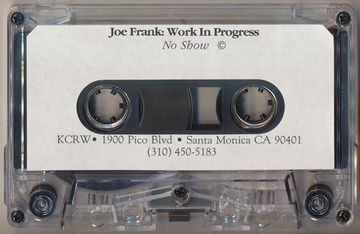No Show: Difference between revisions
m Footnote about source of counseling. |
m Changed format |
||
| Line 31: | Line 31: | ||
* Joe calls a telephone counseling line from the studio.<ref> | * Joe calls a telephone counseling line from the studio.<ref> | ||
<blockquote>'Frank sits expressionless and unblinking, under an enormous pair of headphones, looking like a still life of a man in outer space. He flips a switch that carries his voice to the glassed-in control booth. "Sharon, get me a crisis hot line." | <blockquote>'Frank sits expressionless and unblinking, under an enormous pair of headphones, looking like a still life of a man in outer space. He flips a switch that carries his voice to the glassed-in control booth. "Sharon, get me a crisis hot line." | ||
'Sharon Bates, a station volunteer, makes the call; when she gets through, she waves to Frank, who's resumed his usual, distant, off-air expression. | 'Sharon Bates, a station volunteer, makes the call; when she gets through, she waves to Frank, who's resumed his usual, distant, off-air expression. | ||
'Now he leans forward, his lips nearly touching the microphone, ready for the hot line. "I do a radio program where I talk about my life," he tells the counselor. He rests one hand on his heart. "And because I'm sort of | 'Now he leans forward, his lips nearly touching the microphone, ready for the hot line. "I do a radio program where I talk about my life," he tells the counselor. He rests one hand on his heart. "And because I'm sort of | ||
depressed"--his voice takes on a caressing shimmer--"I thought of calling you on the air."'</blockquote> | depressed"--his voice takes on a caressing shimmer--"I thought of calling you on the air."'</blockquote> | ||
Revision as of 04:38, 17 November 2023
 | |
| Series | |
|---|---|
| Work In Progress | |
| Original Broadcast Date | |
| 1986 | |
| Cast | |
| Joe Frank | |
| Format | |
| Serious Monologue, 88 minutes | |
| Preceded by: | A Landing Strip In The Jungle |
| Followed by: | Let Me Not Dream |
I have an announcement to make this evening. There is no show.
No Show is a program Joe Frank produced as part of the series Work In Progress. It was originally broadcast in 1986.
Synopsis
- Joe announces that there is no show, and spends the program explaining why against soft piano music.
- Discussing the inter-connectedness of all things and the indomitable desire to live with his producer.
- Joe sweeps a tuner across commercial radio stations, suggests his audience listen to something else
- A woman invites herself to Joe's apartment, talks forever about nothing, and harasses his cat. Sharing a frozen dinner with an elderly cat.
- Joe calls a telephone counseling line from the studio.[1]
- A dinner party in Joe's honor, feeling a fraud, discussing the meaning of quality of life. Dinner parties as an Olympic sport.
- The lawsuit against a film company for plagiarism.
- Joe's friend talks about problems with his mother.
- Joe's cat goes into a seizure.
- Living in a noisy neighborhood. Waking up to a Simon & Simon film crew outside.
- Joe picks up a girlfriend at the airport.
Music
- "My First Homage" - Gavin Bryars (from Hommages, 1981) | YouTube [Intro]
- No Show (Remix) (60 minutes)
- Black Light
Additional credits
The original broadcast credits state: "Technical production by Tom Strother."
Miscellanea
- Joe's most truly autobiographical show. 100% true, *probably*. He talks about his daily life and frustrations, and the cumulative interruptions which have caused him to be unprepared to write a show.
- Joe's most "improvised" monologue. You hear him tell unprepared stories about his life, his narrative is less polished, more hesitant, sounds like his "true speaking voice".
- Includes material about his lawsuit against the screenwriter of the Martin Scorcese film After Hours, which is not included in the 60-minute version.
- There is also a 120-minute version that contains duplicated segments plus an excerpt from Joe Frank's America.
Footnotes
- ↑
'Frank sits expressionless and unblinking, under an enormous pair of headphones, looking like a still life of a man in outer space. He flips a switch that carries his voice to the glassed-in control booth. "Sharon, get me a crisis hot line."
'Sharon Bates, a station volunteer, makes the call; when she gets through, she waves to Frank, who's resumed his usual, distant, off-air expression. 'Now he leans forward, his lips nearly touching the microphone, ready for the hot line. "I do a radio program where I talk about my life," he tells the counselor. He rests one hand on his heart. "And because I'm sort of
depressed"--his voice takes on a caressing shimmer--"I thought of calling you on the air."'
